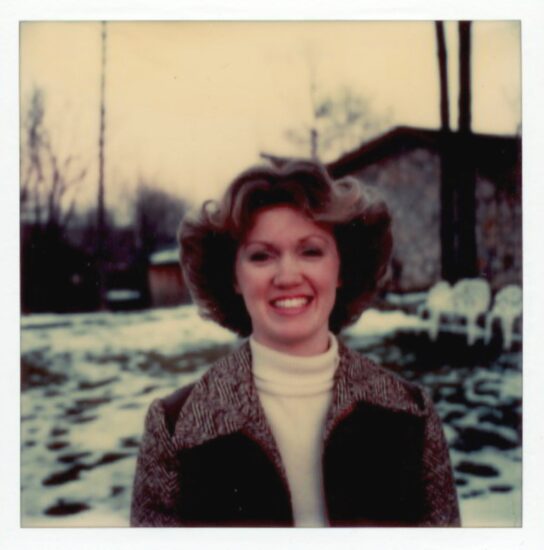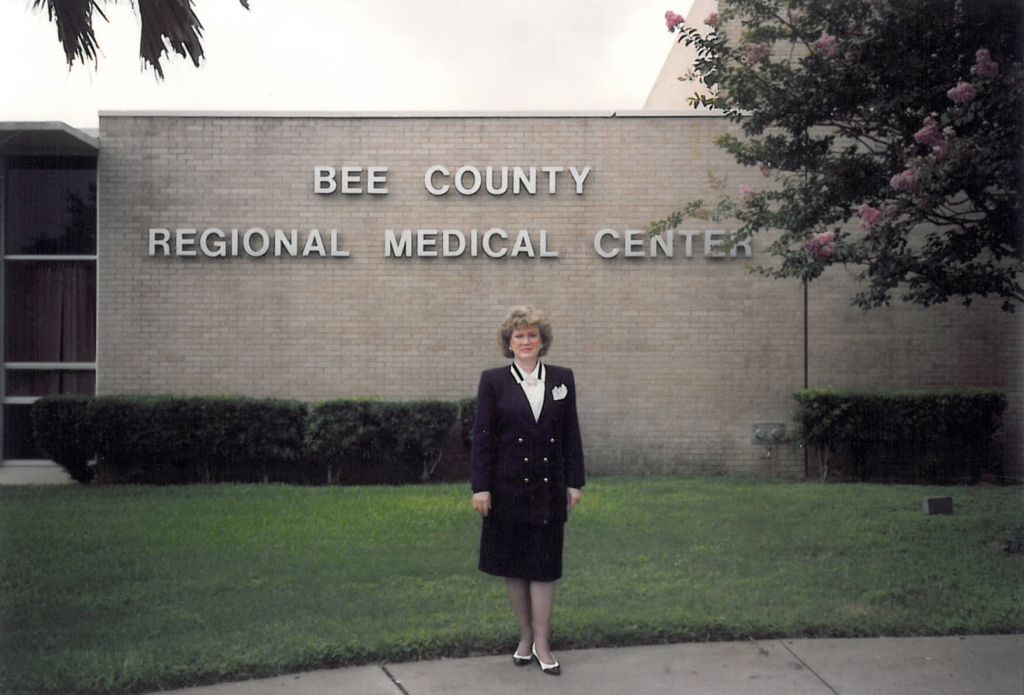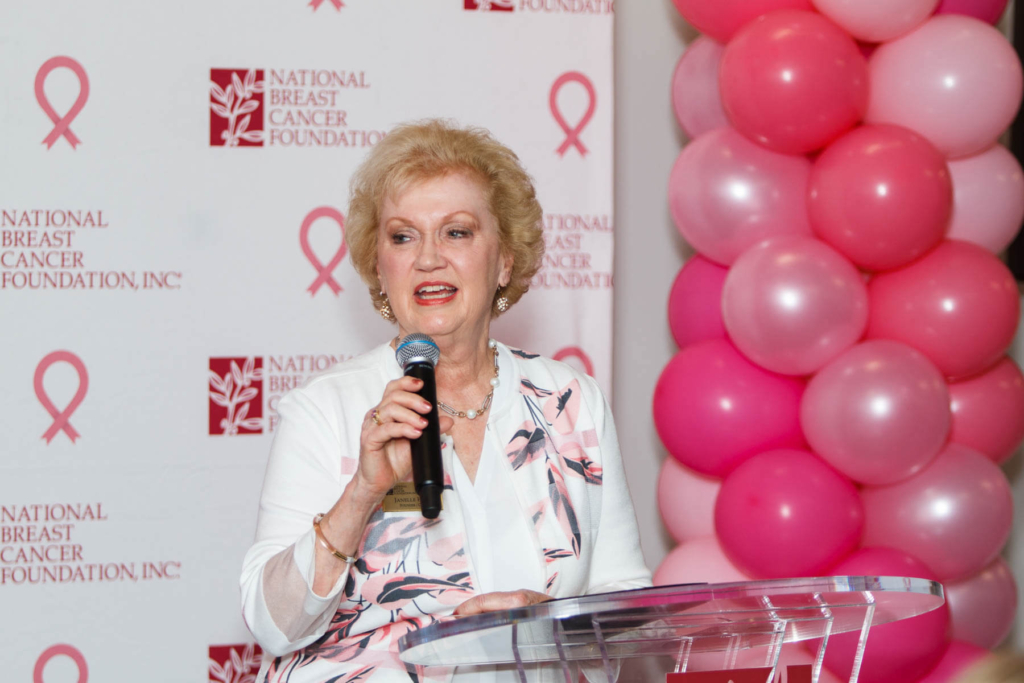


Note: Written by Janelle Hail, founder and CEO of National Breast Cancer Foundation. Janelle reflects on the wisdom and insight provided through 42 years as a breast cancer survivor. Through everything, she leans on her family and community, her faith, and her hope and perseverance to “shine a bright light” on the darkness cancer causes.
At 6:00 a.m., I drowsily opened my eyes in the dimly lit hospital room to see my husband, Neal, my mother, and my mother-in-law standing around my bed with worried expressions. Neal tenderly held my hand and with the kindest eyes I had ever seen said, “Honey, they found you have breast cancer.”
While having a hysterectomy the day before, my doctor had also done a procedure on my breast from a lump I detected two weeks previously. I had no concern about breast cancer since I was 34 years old, healthy, and unaware of the dangers of malignancy. That was the way it was in 1980. No internet to Google medical info and little knowledge of the disease except for what the doctor told you.
My lack of concern suddenly changed. Fear overtook me. Will I live long enough to raise my three sons, ages 3, 10, and 13? Maybe my husband is going to walk away and abandon me in my darkest hour. Fear makes your thinking irrational and clouds reasonable logic.
The next day, they rolled me into the operating room for a mastectomy. The tested outcome of lumpectomies had not been around long enough to prove their effectiveness. I had always been pre-emptive about my healthcare, so a mastectomy seemed to be the best choice.
After the surgery, the doctor explained her findings. She said the lump I felt was benign, but nestled up against it was a small malignancy. I asked her if they would have found the malignant tumor if it had been 1/4th of an inch or 1/8th of an inch over, or even 1/16th of an inch.
She said, “No, we weren’t looking for it there.”
I drew a slow, deep breath and softly spoke, “Then God drew you a roadmap.”
Silence filled the room, but I was sure I had received help beyond medical limitations.
The night after my mastectomy, my anxiety kept me awake. I remember my hospital room was pitch dark. My mind raced with fear and thoughts of what ifs that ended with a wobbly prayer. “God, I don’t understand what is going to happen to me, but I will continue to love and serve you. Please help me!”
With an unusual boldness, I made a spoken declaration. “Cancer, you lurk around in darkness, terrifying me. You have tried to kill me, but you are not my greatest enemy. I am yours! I will come after you with everything within me to conquer you, chase you down to the furthest parts of the earth, and shine a bright light on you to expose the fear you bring.”
Courage like that does not emerge out of the emotions that gripped me at that moment. That’s what God does. He replaces our fears with His conquering love.
When I left the hospital to resume my ordinary life, no further treatment was necessary since the tumor was small. My journey had begun, and I didn’t even know it.
For the next eleven years, my pathway took me down a trail of learning in the industries of professional speaking and writing. During that time, I actively volunteered at a local hospital, learning the ways of the hospital, and gaining favor with the doctors and nurses. Little did I know that my entire future career would involve working with doctors and the medical field.
At the end of those eleven years, Neal and I created NBCF. Over these past 31 years, it has been a light to women worldwide shining in the dark regions of fear and giving hope and understanding through breast cancer education.

My regiment of annual mammograms has continued forty-two years, along with taking care of myself. I thought, If only I had one day without thinking of breast cancer a thousand times, I would be so happy.
Everything went well for a few years after my mastectomy until I started having a consistent twitching in my remaining breast. Since it didn’t go away, I set up a doctor’s appointment and mammogram.
As I walked down the hallway of our NBCF offices to a meeting, my cell phone rang. My doctor said in a somber voice, “Janelle, you may have to deal with breast cancer again.”
In disbelief and no time to gather my thoughts, I tried to concentrate, but my mind wouldn’t work. I don’t remember one word that was spoken at the meeting.
I discovered through the medical process that you don’t have to go through breast cancer alone. Before having a biopsy, my friends surrounded me in prayer and encouragement. No trace of breast cancer.
Over the years, I have told women to pay attention to any changes in their bodies. I never heard of twitching as a warning signal, but there was a change in my body that had to be attended to.
Digital mammography was an exciting improvement during the past 42 years. I first learned of it when I visited the research lab at The University of Texas MD Anderson Cancer Center. NBCF supported new findings of breast cancer research as the medical team explained digital mammography and their discoveries from their newly gained knowledge. Additional advances in technology continue to give women hope for their future.
NBCF provides funding for women who cannot afford them as we work through our network of medical facilities across the United States.
Please don’t make excuses for failing to get your mammogram. Yes, you do have the time! Schedule your mammogram the same way you manage every important thing in your life. It only takes a few minutes and gives you peace of mind. Even if there is an issue, your options for a healthy life are greater at an early stage.

Over time, I stopped thinking about breast cancer a thousand times a day. My thoughts turned away from me to the women we serve. Now I daily focus on how to reach more women and provide services for them all along their journey with breast cancer. I will always be thankful for the life I live and for God turning my sorrow into the joy of life.
Donations are always appreciated, but there are lots of great ways to get involved.
We use cookies on our website to personalize your experience and improve our efforts. By continuing, you agree to the terms of our Privacy & Cookies Policies.
What kind of breast screening and how often should I get screened after a bilateral mastectomy? I don’t feel that my oncologist is as attentive to after care monitoring as he was the initial treatment plan.
Hi Barbara. Thank you for reaching out with this question. NBCF does not have medical personnel on staff and cannot offer medical advice. However, you may find this article about mammogram after mastectomy from the American Cancer Society helpful: https://www.cancer.org/cancer/types/breast-cancer/screening-tests-and-early-detection/mammograms/having-a-mammogram-after-youve-had-breast-cancer-surgery.html
As always, we encourage women to advocate for themselves with their healthcare team. It is always okay to ask for clarification from your team or to request a second opinion, if necessary.